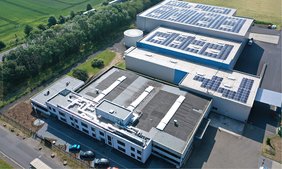From a soap factory in the Eifel region to a global specialist in occupational skin care
"Household soaps were one of the products that sales focused on in the early years. The historical photo is from the 1930s."
"With its portfolio, PGP covers all four pillars of occupational skin care: skin protection, skin cleansing, skin care and disinfection."
"Today's Managing Director Peter Greven is the grandson of the company's founder. He joined the management in 1993 and runs the company together with Dr. Hermann Josef Stolz and Werner Heiliger."
In 1923, Peter Greven founded a soap and glycerine factory in Bad Münstereifel. This gave rise to, among others, Peter Greven Physioderm GmbH (PGP), based in Euskirchen, which is now active worldwide. Today, PGP is a comprehensive system provider in occupational skin care and is regarded as an innovation leader in the industry. The third-generation family business cooperates in research with leading universities in Germany and is constantly working to further develop its solutions in the field of skin care.
It all started with soda, household soaps and washing powder: When the young entrepreneur Peter Greven founded a soap and glycerine factory in Bad Münstereifel in 1923, the focus was on these products and their distribution in the local area. At that time, the young man from the Eifel would never have imagined that this would one day become a globally active group of companies.
Greven started with few employees, but with all the more commitment and enthusiasm. Business developed well. So well, in fact, that as early as 1934 a new plant for fat splitting and glycerine extraction was put into operation to meet the growing demand for fatty acids. This made the young company more independent of the raw material markets - and at the same time it was possible to add further products to the production range. After the Second World War, the sons Heinz and Günther Greven took up their work in the family business. In the years that followed, the soap factory continued to develop into a producer of oleochemical additives and derivatives. In the field of oleochemicals, the Peter Greven Group is now a global player: customers in more than 85 countries are supplied from production sites in Germany, the Netherlands, Malaysia and the USA.
The systematic development of modern skin cleansing products began in 1958. Curd and soft soaps had already been part of Peter Greven's portfolio since the founding years, but the new surfactant-based liquid soaps were a quantum leap in terms of their cleansing effect and skin-friendliness. From then on, the skin cleanser business was bundled in the newly founded subsidiary "Chemische Fabrik Iversheim"; the new products were marketed under the name "Ivraxo".
Strategic brand acquisitions expand portfolio
In the 1980s, skin cleansing products were joined by those for skin protection and skin care - among other things through a cooperation with Penaten. In the first decade of the new millennium, further important decisions were then made that were decisive in Peter Greven becoming the number 1 in the German skin care market. The portfolio grew steadily through strategic acquisitions of competitors' brands and customers: in 2006, Greven took over the "Lordin" brand. This special trade program, characterized by a simple system, highly effective products and a variable dispensing system, is specifically designed for workshops and craftsmen. In 2008, the brands "Physioderm" and "Lindesa" were added. "Physioderm" is a comprehensive range for all occupational skin care requirements, optimized for skin compatibility and dermatological efficacy. It therefore also appeals to occupational groups with increased dermatological requirements and people with sensitive skin. UV protection - a very important growth area - is also housed under the "Physioderm" brand umbrella. The "Lindesa" brand, on the other hand, is also known to many customers in the consumer sector. The "Lindesa" products are based on beeswax and have a large fan base.
Also since 2008, all skin care activities have been bundled in Peter Greven Physioderm GmbH, into which the "Physioderm" and "Lindesa" programs have been integrated. PGP's skin care range is completed by the Myxal program, which includes products for disinfection and hygiene in the workplace as well as insect and tick repellents. PGP thus covers all four pillars of occupational skin care: skin protection, skin cleansing, skin care and disinfection.
"We constantly invest in research and development and maintain an intensive exchange with our customers and users. This is the basis for the quality of our products and the success of the company," says Peter Greven. The grandson of the company's founder joined the management board in 1993 and today heads the company in the third generation, together with Dr. Hermann Josef Stolz and Werner Heiliger.
There are numerous examples of PGP's innovative strength. For example, the company developed "Active Soft Pearls," a skin-friendly alternative to abrasive heavy-duty hand cleaners, in which soft, smooth pearls made of wax bind the oily dirt particles. Most recently, PGP attracted attention with the development of a new generation of hand cleaners. This is based on a special surfactant combination that PGP has patented under the name "OptiTens". The surfactant combination combines high cleaning power with special skin-friendliness - a combination that was previously considered impossible among experts.
In all its products, PGP uses renewable raw materials wherever possible. More than 90 percent of the ingredients used now come from renewable sources. Awards for cleaning products such as the Blue Angel and the EU Ecolabel show that the company is on the right track with its sustainability efforts. Despite all the success and growth - PGP is now active worldwide - the Euskirchen-based company has never forgotten its roots. "We are firmly anchored in the region. As a medium-sized family business, social responsibility, reliability and long-term partnerships are very important to us," says Peter Greven. "These values have lost none of their importance even after 100 years and will shape our future development."





